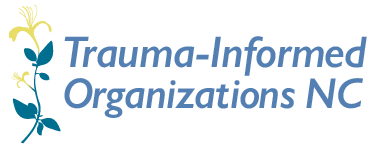The following are questions to think about when developing trauma informed policies and practices for your organization.
- What does safety in the workplace look like? What does safety NOT look like?
- How does the organization consider physical and psychological safety in the workplace?
- What safety concerns is the organization dealing with that seems most present?
- What do folks need in order to strengthen safety, physical and psychological safety, in the workplace?
- What happens when staff have differing ideas and/or needs around safety? Examples could include differing needs around light sensitivities, food needs, social and cultural differences, etc. How do you negotiate this?
- What does safety at work look like for everyone who works at the organization? Do staff feel like they can talk about their own personal safety needs in group spaces?
- Do staff have access to private spaces for meetings and supervision?
- How do organizations build trust with their workers and with the community served?
- How is trust maintained? Why is trust important?
- What are some examples of trust building in our organization that can be expanded on?
- How are decisions made in the organization? How transparent is the process to all staff?
- Do staff have decision-making power or are they able to influence the way policies are created? Have they been genuinely consulted or included in the process?
- How does the organization ensure that all staff have sufficient information to contribute to decision making?
- What are the unintended consequences of this policy?
- Do staff have access to non-judgmental spaces where they can access support? What kinds of peer supports can staff access in the organization (formal or informal)? Do staff have access to trauma-informed supervision?
- Does this policy enhance opportunities for staff accessing support with one another? Does this policy increase isolation for staff?
- Does this policy help to level power at the organization?
- What are the unintended consequences of this policy?
- How are staff able to contribute to decisions that affect their work lives?
- Do staff have sufficient information to contribute to agency wide decision making?
- How are staff’s strengths built upon at work?
- What does empowerment look like for the service population and for the staff?
- How does historical trauma impact your work? How does this organization seek to not do further harm in this area?
- What commitments has the agency made to work towards equity?
- Does the agency have a clear analysis of how intimate partner violence and oppression intersect?
- What policies and practices are in place that Does the agency have gender-neutral restrooms?
- Does this policy leave out any groups of people?
- How are the benefits offered by the organization reflect the lived experiences of the workers?
- What are the unintended consequences of this policy?
- How does the organization handle change in general? Or how has the organization previously handled an organizational change (for example, changes made during the COVID-19 Pandemic or other changes due to a natural disaster)?
- What are the lessons learned from these experiences? How can these lessons inform future changes?
- Who is responsible for ensuring that changes or adaptations occur? How is information passed along to staff?
- If time permits, how are staff able to weigh in on changes?
